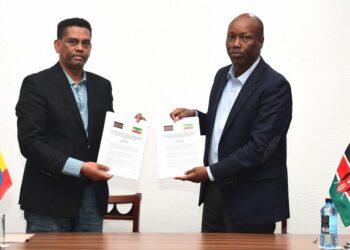Safaricom’s journey into Ethiopia represents one of the most ambitious expansions in Africa’s telecommunications history, blending opportunities and challenges in a rapidly evolving market.
A Landmark License Announcement
On Friday, July 9, 2021, Ethiopia’s Finance Minister announced that Safaricom, through its Global Partnership for Ethiopia consortium, had been awarded the first private telecom license in the country. The landmark decision ended the monopoly of state-owned Ethio Telecom, signaling Ethiopia’s commitment to liberalizing its economy.
The license came at a hefty price: the consortium paid $850 million to the Ethiopian government through the National Bank of Ethiopia. It was a significant investment, marking Ethiopia’s most substantial Foreign Direct Investment at the time.
Safaricom Officially Launches in Ethiopia
After extensive preparations, Safaricom Ethiopia officially launched its mobile network in October 2022, becoming the first private telecom operator in the country. The network initially covered 10 cities, including Addis Ababa, with plans to expand rapidly.
In his launch speech, Safaricom CEO Peter Ndegwa declared:
“Since the commercial launch in October, the brand is visible, deeply rooted in Ethiopia, and quickly becoming the fabric of society. The potential for Ethiopia is immense, and we look forward to the future with optimism and excitement.”
By May 2023, the company had made remarkable progress:
- Gained nearly 3 million customers.
- Built a distributor network with 114 outlets.
- Established a network covering 22 cities and regions with 1,300 sites.
- Employed over 900 staff, 81% of whom were Ethiopian.
Green Light for M-Pesa
In May 2023, Safaricom achieved another milestone when it was granted a license to operate its iconic mobile money platform, M-Pesa, in Ethiopia. This approval came seven months after launching GSM services, paving the way for the company to offer its highly successful digital financial services.
Peter Ndegwa emphasized the significance of this achievement:
“This is a great milestone following our entry into Ethiopia. This positions us to provide essential financial services to the Ethiopian population. We are looking forward to launching and rolling out the service over the next few months.”
By the time of the M-Pesa launch in August 2023, Safaricom Ethiopia had registered over 7 million users, including 4.1 million active customers.
Challenges behind safaricom
1. Ethiopian Birr Depreciation
One of Safaricom Ethiopia’s biggest hurdles has been the sharp depreciation of the Ethiopian birr, which fell by 106.3% year-on-year by late 2024. This created significant financial challenges, including a $135 million loss due to revaluation of liabilities like foreign currency borrowings and lease obligations.
2. Regulatory Inconsistencies
Experts have pointed out Ethiopia’s wavering commitment to liberalization. Russell Southwood, CEO of Balancing Act telecom consultancy, noted:
“You can never be quite clear what it is the Ethiopian government is doing. It’s liberalizing one minute and then the next minute it’s taking everything back.”
3. Competition with Ethio Telecom
Despite liberalization efforts, Ethio Telecom continues to dominate with 72 million subscribers and a substantial profit margin. Ethio Telecom’s mobile money service, Telebirr, launched earlier and captured a significant user base, creating stiff competition for M-Pesa.
Long-Term Vision for Ethiopia
Safaricom remains optimistic about its future in Ethiopia, even as challenges persist. CEO Peter Ndegwa’s statements underscore the company’s resilience and strategy:
“When you enter a new business, everyone expects money from day one. That’s a misconception. You have to invest, be patient, and 3, 4, 5 years later, the money starts to flow.”
By March 2027, Safaricom expects its Ethiopian operations to break even, despite extending its timeline due to currency devaluation. Ndegwa shared insights into the company’s vision:
“We are doing the heavy lifting. In future, Ethiopia will deliver more than half of the growth of Safaricom Group. People should be patient—just like when you set up a new business.”
Investment and Growth Projections
To achieve its ambitions, Safaricom has committed to an investment of $2.5 billion, with about half of that from the company itself. By the end of March 2025, it expects to have over 10 million customers, and by the medium term, 15 to 20 million users, representing about half of Kenya’s current base.
Ndegwa highlighted the significance of Ethiopia’s market:
“The usage of mobile data in Ethiopia is much, much more than in Kenya. Customers are using 6.6GB per month compared to about 4.1GB in Kenya, which means we see a huge opportunity.”
Balancing Challenges and Opportunities
Safaricom Ethiopia exemplifies the delicate balance between seizing growth opportunities and navigating challenges in a new market. Ethiopia, with its 117 million population and low mobile penetration, represents untapped potential. Yet, obstacles like currency volatility, political risks, and regulatory barriers make the path forward complex.
As Ndegwa aptly summarized:
“Although Ethiopia is an investment-heavy project, Kenya’s business continues to power on. This is the right time to position Safaricom for the future, and by 2027, Ethiopia will propel this company to the next stage.”
Safaricom’s expansion into Ethiopia is not merely a business venture but a bold step in shaping the future of telecommunications in one of Africa’s most promising markets. While the journey has been challenging, the company’s commitment and long-term vision underscore its belief in Ethiopia’s transformative potential.





















